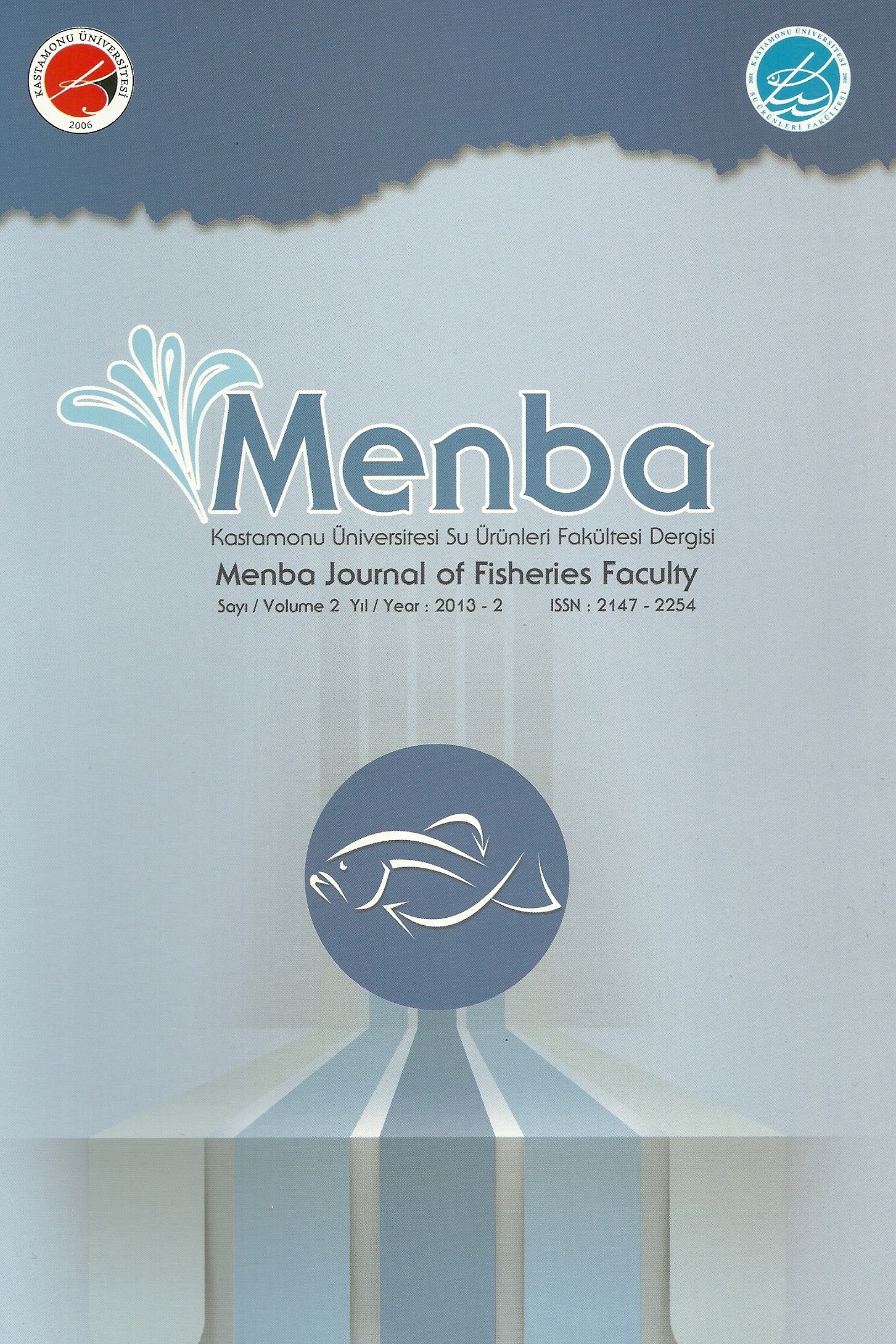İzmir Körfezi Kıyılarından Toplanan Makroalglerin Pigment Potansiyeli
Makro alg, pigment, İzmir Körfezi, algal metabolitler
___
- Batista, A.P., Gouveia, L., Bvearra, N.M., Franco, J.M. & Raymundo, A., (2013). Comparison of microalgal biomas profiles as novel functiınal ingredient for food products. Algal Resource, 2: 164-173.
- Boussiba, S., Bing, W., Yuan, J.P., Zarka, A., Chen, F., (1999). Changes in pigments profile in the green algae Haeamtococcus pluvialis exposed to environmental stresses, Biotechnol Lett., 21, 601–604.
- Cardozo, K.H.M., Guaratini, T., Barros, M.P., Falcao, V.R., Tonon, A.P., Lopes, N.P., Campos, S., Torres, M.A., Souza, A.O., Copepicolo, P., Pinto, E., (2006). Metabolites from algae with economical impact, Comparative Biochemistry and Physiology, 146:60-78.
- Dere, Ş., Dalkıran, N., Karacaoğlu, D., Yıldız, G., & Dere, E., (2003). The determination of total protein, total soluble carbonhydrate and pigment contents of some macroalgae collected from Gemlik-Karacaali (Bursa) and Erdek-Ormanlı (Balıkesir) in the Sea of Marmara, Turkey. Oceanologia, 45(3): 453-471.
- Durmaz, Y., H.A., Duyar, Ş., Gökpınar, Y.Ö., Öğretmen ve N.M., Bandarra, (2008a). “Ulva spp. (Sinop, Karadeniz) Türünün Yağ Asitleri, Α-Tokoferol ve Toplam Pigment Miktarının Araştırılması” Journal of FisheriesScience.com, 2(3), 350-356.
- Durmaz, Y., H.A., Duyar, Ş., Gökpınar, Y.Ö., Öğretmen ve N.M., Bandarra, (2008b). “Ulva spp. (Sinop, Karadeniz) Türünün Yağ Asitleri, Α-Tokoferol ve Toplam Pigment Miktarının Araştırılması” Journal of FisheriesScience.com, 2(3), 350-356.
- Giordano, P., Scicchitano, P., Locorotondo, M., Mandurino, C., Ricci, G., Carbonara, S., Gesualdo, M., Zito, A., Dachille, A., Caputo, P., Riccardi, R., Frasso, G., Lassandro, A., Di Mauro and Ciccone, M.M., (2012). Carotenoids and Cardiovascular Risk Curr Pharm Des, 18: 5577-5589.
- Gouveia L., Nobre B.P., Marcelo F.M., Mrejen S., Cardoso M.T., Palavra A.F., Mendes R.L., (2007). Functional food oil coloured by pigments extracted from microalgae with supercritical CO2. Food Chemistry 101 (2007) 717–723.
- Gündoğan, N., Citak, S., Yücel, N., Devren, A., (2005). A note on the incidence and antibiotic resistance of Staphylococcus aureus I solated from meat and chicken samples. Meat Science 69(4):807-10.
- Haryatfrehnia, R., Dewia, S.C., Meiliandaa, A., Rahmawatia, S., Saria, I.Z.R., (2015). Preliminary Study the Potency of Macroalgae in Yogyakarta: Extraction and Analysis of Algal Pigments from Common Gunungkidul Seaweeds. Procedia Chemistry 14: 373–380.
- Hosikian, A., Lim, S., Halim, R. and Danquah, M.K., (2010). Chlorophyll Extraction from Microalgae: A Review on the Process Engineering Aspects. International Journal of Chemical Engineering, Article ID 391632, p:11.
- Ito, K., & Hori, K. (1989). Seaweed: chemical composition and potential food uses. Food reviews international, 5(1), 101-144.
- Kumari, V., Antonova, E., Fannon, D., Peters, E.R., Ffytche, D.H., Premkumar, P., (2010). Beyond dopamine: functional MRI predictors of responsiveness to cognitive behaviour therapy for psychosis. Front Behav Neurosci; 4:4
- Limantara, L., P. Koehler, B. Wilhelm, R.J. Porra and H. Scheer. (2006). Photostability of Bacteriochlorophyll a and Derivatives: Potential Sensitizer for Photodinamic Tumor Theraphy. Photochemistry and Photobiology 82: 770-780.
- Marin, N., Morales, F., Lodeiros, C., Tamigneaux, E., (1998). Effect of nitrate concentration on growth and pigment synthesis of Dunaliella salina cultivated under low illumination and preadapted to different salinities, J. Appl. Phycol., 10, 405–411.
- Masojıdek, J., Torzillo, G., and Koblızek, M., (2013). Photosynthesis in Microalgae. Handbook of Microalgal Culture: Applied Phycology and Biotechnology, Second Edition. Edited by Amos Richmond and Qiang Hu. P:21-36.
- Ortiz, J., Romero, N., Robert, P., Araya, J., Lopez-Hernandez, J., Bozzo, C., Navarrete, E., Osorio, A., Rios, A., (2006). Dietary fiber, amino acid, fatty acid and tocopherol contents of the edible seaweeds Ulva lactuca and Durvillaea antarctica. Food Chemistry 99 (1): 98–104.
- Pinchetti, J.L.G., Fernández, E.C., Diez, P.M., Reina, G.G., (1998). Nitrogen availability influences the biochemical composition and photosynhesis of tank-cultivated Ulva rigida (Chlophyta), Journal of Applied Phycology, 10: 383-389.
- Ramaraj, R., Tsai, D.D.W., Chen, P.H. (2013). Chlorophyll is not accurate measurement for algal biomass. Chiang Mai Journal of Science, 40, 547-555. Rameshkumar, S., Ramakritinan, C.M., Yokeshbabu, M. (2012). Proximate composition of some selected seaweeds from Palk bay and Gulf of Mannar, Tamilnadu, India. Asian Journal of Biomedical and Pharmaceutical Sciences 3(16), 1-5.
- Sánchez M.D., Mantell, C., Rodríguez, M., Martínez de la Ossa, E., Lubián, L.M., Montero O., (2005). Supercritical fluid extraction of carotenoids and chlorophyll-a from Nannochloropsis gaditana, Journal of Food Engineering, 66: 245–251.
- Topcuoğlu, S., Ergül, H. A., Baysal, A., Ölmez, E. and Kut, D., (2003). Determination of radionuclides and heavy metal concentrations in biota and sediment samples from Pazar and Rize stations in the eastern Black Sea. Fre. Environ.Bull. 12: 695-699.
- Zou, N., Richmond, A., (2000). Light-path length and population density in photoacclimation of Nannochloropsis sp. (Eustigmatophyceae). Journal of Applied Phycology, volume 12, p: 349-354.
- Zucchi, M.R., and Necchi Jr, O., (2001). Effects of temperature, irradiance and photoperiod on growth and pigment content in some freshwater red algae in culture. Phycological Research, volume 49, Issue 2, p: 103-114.
- ISSN: 2147-2254
- Yayın Aralığı: Yılda 2 Sayı
- Başlangıç: 2013
- Yayıncı: Kastamonu Üniversitesi
Deniz Ürünleri Kaynaklı Paralitik Zehirlenme
Sezginer TUNCER, Hatice TORCU KOÇ
Değirmen Deresinin (Kastamonu) Üzerindeki Alabalık İşletmelerinin Bentik Makroomurgasızlara Etkisi
Süleyman ÖZDEMİR, Hünkar Avni DUYAR, Uğur ÖZSANDIKÇI
A Review on Antibacterial Effects of Fish Skin Mucus and Fish Lectins
Yiğit TAŞTAN, Adem Yavuz SÖNMEZ
Tıbbi ve Aromatik Bitkilerin Balık Yetiştiriciliğinde Kullanım Potansiyelleri
İzmir Körfezi Kıyılarından Toplanan Makroalglerin Pigment Potansiyeli
